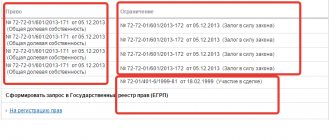Despite the scale of the process of privatization of residential real estate, at this time there are still apartments belonging to the municipal authorities or service ones. Accommodation in them is carried out on social rental terms, but this does not mean that residents do not have any rights in relation to their housing.
A non-privatized apartment becomes a home for residents for a long time; many issues need to be resolved in it, for which registration is required. Those who live in municipal housing and have signed a rental agreement can register here, as well as register other people, their relatives, there.
But the issue of registration in municipal housing should be decided by all residents, with their consent. Registration is carried out taking into account the norms of the law; violation can lead to punishment for the perpetrator and a fine.
The question of whether it is possible to register a person in a non-privatized apartment has a positive answer. But you must complete the entire process sequentially. If you have any problems, you should seek help from a good lawyer and look for information on legal websites.
Consent of all residents
In order to register in non-privatized housing, you must have the consent of everyone living in it. Therefore, if you need to register a stranger in a municipal apartment, you should first talk with family members, discuss this problem, perhaps someone living in the house is not happy with the situation. Who can be registered without the consent of the residents?
A minor child has this right; the law protects his rights and allows registration without any conditions. It is only important that one of his parents is already registered here . But registering an adult daughter in a municipal apartment will require discussion and consent of other people registered here and the landlord.
Advantages and disadvantages
Living in a municipal apartment has its advantages and disadvantages.
Its main advantages:
- No apartment tax
- Major repairs are carried out at state expense
- Living conditions can be improved at public expense
- You will not encounter fraud when obtaining an apartment
- Lower utility costs
Among the disadvantages:
- Inability to dispose of housing at your own discretion
- If your neighbors have a justified complaint, you may be evicted.
- After the death of the tenant, the apartment is not inherited, but returned to the state
Despite the presence of significant disadvantages, there are plenty of people who want to get such housing. The number of applications exceeds the number of existing areas. Therefore, first of all, those who do not have housing, or live in emergency premises, or when there is less than 10 square meters per resident can apply for a municipal apartment.
Having received an apartment, the owner is obliged to pay for utility services. The amount of such payments corresponds to the current tariffs.
As can be seen from all of the above, for low-income citizens, municipal housing is an excellent solution.
How is registration carried out?
Who can register in a non-privatized apartment belonging to the municipal housing stock? This can be done by the landlord and his family members. If you then need to assign someone else, you will need written consent from everyone already assigned:
- First, you should go to the local administration and write a statement regarding the registration of one more person.
- If the local administration has no objections, it gives permission, and other family members also sign such a statement.
- The next step is for the person who needs registration in a municipal apartment to submit a passport for registration.
Which is better - social, municipal or private property...
The concepts of “municipal housing” (municipal housing stock) and “social rental housing” (social housing) are close in meaning to the concept of “state real estate”.
For example, the term “social housing” in our country can be described as a way of providing citizens of the Russian Federation with housing, in which the state or municipal government remains the owner of the home.
The confusion of concepts on the territory of Russia is due to the fact that in our country for a long time all property was state-owned, excluding cooperative housing. And there was no difference between public and state.
Let's look at the differences between state-owned housing and privatized housing. Firstly, if the issue of major repairs arises, the owner of the privatized apartment pays for the repairs. But those who live in a municipal apartment do not.
This rule also “works” in the event of force majeure, although often the state takes on the costs in cases of natural or man-made disasters, and helps people affected by floods, fires, etc.
The same rule applies in the case when housing is recognized as dilapidated: privatized real estate remains private property, and the Russian Federation, a constituent entity of the Russian Federation or a municipality is still responsible for state real estate. Therefore, citizens living in municipal housing should be provided with residential square meters to replace the dilapidated stock.
Check-in
Only those people who have the right to live in it can register in an apartment. Therefore, it is important to separately consider the occupancy of family members and the occupancy of strangers.
ATTENTION! In order for someone from strangers, not family members, to settle here, you will need permission from the municipal government, whose property is the apartment. The authorities do not always give such permission; sometimes legal difficulties arise.
Temporary and permanent registration
If you need to register someone in an apartment, you need to take into account different types of registration. Permanent registration gives many rights to housing. In particular, the registered person will in the future be able to claim part of the housing and participate in privatization. Related to this is the legal requirement for the consent of all residents.
What rights does temporary registration give and what rights do permanent ones are considered by several legislative documents:
- This is the Housing Code of the Russian Federation.
- Constitution of the Russian Federation.
- Administrative regulations of the FMS.
- Government Decree No. 173 of July 17, 1995 “On approval of registration rules.”
Temporary registration at a new place of residence is also permitted for a period of up to 90 days. But it must be real, with the permission of the property owner. The Housing Code defines fictitious registration as a violation of the law, for which penalties are imposed under administrative liability.
Procedure
This process has fewer complications, but it also depends on the degree of relationship assigned to the tenants of the apartment.
ATTENTION! You can register children, spouses, and parents without consent.
A more distant relative (brother, grandmother, others) is registered with the written consent of other residents. By law, spouses must financially support each other. If one of them moves into municipal housing, he can register the other of the pair there; an application from one person is sufficient for registration.
When the apartment is privatized in the future, both husband and wife will receive equal rights to it. This rule also applies to minors.
It is enough for one of the parents to submit an application to the FMS service. When mom and dad live at different addresses, the child can be assigned to any of them. The important question here is how to deregister a registered relative from a non-privatized apartment if this relative is a minor child? In this case, the child will be discharged with the permission of the guardianship council and only on the condition that his parents immediately register him in a new apartment with good living conditions.
How can I register a non-relative?
If there is permission for such registration, then the process will be standard, only with some features.
IMPORTANT! The main condition is the consent of other relatives. It must be in writing.
It is important that when another person is registered in the apartment, each of the residents receives the required number of square meters. Living space standards may vary in different regions, but not significantly. FMS, service workers, will check the area of the apartment, how much is allocated to each person. If the norm is violated, registration of another person will be denied.
When no one is registered in the apartment
If someone is not registered in the apartment, it is considered unoccupied. You can live in it only after signing a social tenancy agreement.
Such an agreement is signed by one of the family members, and then children and a spouse can register.
After registering at the apartment’s address, as indicated by the law on non-privatized apartments, they also automatically become parties to the agreement to live in this housing.
Such registered citizens can live for the prescribed period and use their other rights in relation to real estate . If the tenant who signed the agreement dies, the rights of other members of his family to live in the apartment are not lost.
Right of inheritance
As mentioned above, since a municipal apartment is the property of the state, after the death of its owner it automatically passes back to the municipality. The general right of inheritance here has no legal force, since only the personal property of citizens can be inherited by law.
Some Elected Officials' Solution: Bypassing the Law
But some mayors, refusing to let go of their social housing, are organizing to circumvent the law. This concerns Patrick Balkana, mayor of Levallois-Perret. Explanations by Anne-Eugénie Faure, her socialist opponent. It is also a case of Clichy transferring this social housing to a department owned by political friends.
Moralizing Attributions: An Impossible Dream?
This is what some experts in the sector think, such as Jean Levine, the former mayor of the center who left Chaville. He knew the problem well.
Attribution in itself is not a real thing: we will never find a perfect transparent system. Can we resolve this issue using criteria? Not everything will depend on common sense and humanity on the chosen one.
A way out of this situation may be a will with an order for privatization. Relatives of the deceased have the right to file a claim in court to re-register the living space in their name through inheritance, with the subsequent right of privatization. In addition, you should not lose sight of the fact that only persons who are registered in this apartment can claim the right of inheritance.
To avoid litigation and eviction, the best solution would, of course, be the privatization of municipal housing by the owner during his lifetime. In this case, he can bequeath it, donate it, and even without these orders, the relatives will be able to enter into a legal inheritance.
The information in this article is provided for informational purposes only. We recommend that you contact our lawyer.
Description:
Municipal apartment is
housing owned by the municipality, allocated to citizens without property rights with the conclusion of a social rental agreement.
The advantages
of living space owned by the state.
Among the advantages, the following aspects can be highlighted: 1. Not taxed. 2. A citizen has the right to count on improved living conditions. 3. In the event of irreversible damage or destruction of the apartment, the tenant may apply for a new and equivalent dwelling. 4. By law, the tenant has the right to thoroughly repair individual areas or the entire premises. If the work was carried out by the tenant himself, or the alterations made by the management company turned out to be of poor quality, the citizen can seek reimbursement of expenses in court. 5. For elderly, lonely and disabled people, the big advantage is the minimal risk of deception from scammers. It is very difficult to privatize a municipal apartment without delay, and the tenant cannot manage the housing independently. Criminals will not be able to quickly and quietly take over their living space using deception or violence. It turns out that a municipal apartment is perfect for living by anyone who has no intention of exchanging or selling it. Disadvantages
of non-privatized housing: 1. It is not easy, and sometimes impossible, to rent out an apartment. To do this, responsible tenants need to complete a lot of approvals: . consent of all registered family members; . permission from neighbors; . confirmation that no one in the family suffers from serious illnesses; . permitting certificate from the management company 2. The biggest disadvantage of a municipal apartment is the danger of losing it due to complaints from neighbors about the defendant violating the rules of the generally accepted charter or by a decision of the authorities to use residential meters for other purposes. 3. Relatives of a family member who is not at the place of permanent registration have the right to ask the court to make a decision to evict him, since he has not fulfilled his obligations to pay and maintain order in his home for a long time. Due to the death of the tenant, also called the responsible tenant, everyone who lived in the apartment without registration is subject to eviction by court order. A long period of cohabitation with the deceased, testamentary notes and other arguments are not considered by the court. The municipal apartment will go to those relatives who were paying the rent at the time of the owner’s death and were registered at this address. If a person living in a non-privatized home plans to exchange, donate or sell it, resolving issues will become very problematic, and often insoluble, because the housing, which was actually leased from the state, does not belong to the citizen.
The most famous US prison escapes
05.09.2020
Ten pieces of advice for relatives of prisoners Dear relatives and loved ones of prisoners
05.09.2020
Why are army and prison life based on the same concepts of violence and submission?
05.09.2020
Residents' rights
Without the help of an experienced lawyer, it is sometimes difficult to figure out what rights there are to a privatized apartment without ownership rights to it, and what rights there are to a municipal apartment when living under a social tenancy agreement. Registration allows you to:
- Use the living space for an unlimited time and without obstacles.
- Move in close relatives.
- Register minors if you have the right to represent them.
- Receive housing if this apartment is alienated.
- Participate in the privatization process.
Participation in privatization is the main point that obliges other residents to responsibly agree to registration. After all, then it will be difficult to prove that this person should not receive a share in the apartment. In addition, the shares of all other family members will be reduced with the arrival of a new tenant.
What you should know about public housing
All residential premises in the country are divided into several categories:
- Private housing stock
- Public housing
- Premises owned by municipalities
Thus, a municipal apartment is an area that is allocated to citizens for use on the basis of a social tenancy agreement.
That is, this apartment does not become the property of the tenant. The owner cannot donate it, sell it, or bequeath it. Even such housing can be privatized only in cases strictly defined by law.
There are other features too. For example, with repairs. Minor cosmetic work can be done indoors. However, major alterations require municipal approval.
The state carries out major repairs at its own expense. If your roof is leaking, communications have failed, or you simply want to insulate your house, apply. And it’s not a fact that she will be satisfied. In this case, it is worth hiring independent specialists to conduct an examination and obtain a certificate. Then you can carry out major repairs at your own expense, preserving all financial documents (receipts, invoices, etc.) in order to demand reimbursement of costs from the state.
Documentation
What documents are needed for a room or apartment for registration in non-privatized real estate? The tenant of such housing does not have any documents for it, except for the social tenancy agreement on the basis of which he lives here.
Therefore, he submits to the FMS the passport of the potential new tenant, this agreement, an application with the signatures of other tenants. Also included is the written consent of all family members to register one more person.
The service has 3 days to consider the application, after which the passport must be returned with the existing registration. The registration stamp contains the following information: apartment address, authority that performed the registration, date.
DOM.RIA – Differences between a municipal apartment and a social one
The legislation of Ukraine provides for a procedure for providing housing to citizens who need to improve their living conditions, but cannot purchase or rent real estate with their own money due to low income. For these purposes, territorial authorities use social and municipal housing.
What is social housing rental
Because these two concepts are so closely related, they are often mistaken for one. But they have differences. Therefore, in a certain context it is important to distinguish them, and only in some cases can they be used as synonyms.
Social and municipal housing: what is the difference?
According to the Law “On Social Housing Fund,” a social rented apartment is residential real estate of all forms of ownership that belongs to the corresponding fund. These can be state, communal apartments or private living space used by the fund under an agreement concluded with the owner.
A municipal apartment in the traditional concept is real estate for the social needs of the population, owned by the municipality - local authorities. As a rule, such living space is provided to citizens on the basis of a rental agreement or warrant. It turns out that municipal property is the same as communal property.
“The term “municipal authority” is synonymous with the concept “municipal authority.” It is similar to the concept of “commune” (translated from the French language “commune” means community, and from the Latin “communis” - a living place) and is lived as a common practice from the term “municipal authority” among wealthy foreigners countries" – Glinska O. V. “Territorial community as a subject of the law of communal power”
Thus, only that municipal property can be considered social, which belongs to the social fund. At the same time, social real estate is municipal only if it belongs to communal property.
What is public housing
For example, private living space, which is included in the social fund on the basis of the relevant agreement (Clause 7 of Article 5 of the Law “On Social Housing Fund”), should not be considered municipal real estate, although it is social.
It turns out that an apartment is simultaneously considered municipal and social only if the following two conditions are met:
- real estate belongs to the social fund;
- housing is owned by a local government body (municipal form of ownership).
From the above, it becomes clear that social and municipal apartments are two different concepts. The first is related to the type of housing stock, and the second to the form of ownership. Therefore, it is impossible to replace one with the other.
In Ukraine, municipal housing programs are practiced, somewhat moving away from traditional methods and concepts. For example, in Vinnitsa, local authorities built municipal apartments with the aim of selling them to citizens at a price favorable to the population.
Let's look at the positive and negative aspects of apartments that are both social and municipal.
How to get social or municipal housing
To have the right to occupy social or municipal housing, you must respectively conclude a social tenancy agreement or obtain a warrant from the local government. To do this, you need to register at your place of work or through the Administrative Services Center (ASC).
What is an apartment warrant?
You can register for municipal housing if you need to improve your living conditions. To do this, you must comply with the conditions of Article 34 of the Housing Code.
In order to have the right to social rent, in addition to the need to improve housing conditions, a citizen must have an average monthly income for the year not higher than the subsistence level and the average rental price of housing in his city (Clause 2 of Article 10 of the Law “On Social Purpose Housing Fund”).
From these legislative norms it follows that the requirements for citizens applying for municipal and social housing are somewhat different.
Municipal housing in social rent: advantages
Renting municipal housing from the social housing stock is an opportunity for vulnerable segments of the population to have a roof over their heads for an affordable price. By law, the amount that a tenant must pay for housing cannot exceed 20% of the total income of the family living here. The advantages of a social municipal apartment are as follows:
- the cost of rent for a tenant is lower than the market rental price (part of the costs is covered by the state);
- the apartment is selected taking into account the needs of the tenant (the presence, number and gender of children, disability, age, presence of diseases, etc. are taken into account);
- profitable and simple maintenance, since the tenant does not have to carry out major repairs here or worry about the quality of utilities (these are the responsibilities of the landlord), etc.
Social rental of municipal housing: disadvantages
The main disadvantage of a social housing stock is the impossibility of privatization (Clause 5, Article 3 of the Law “On Social Housing Stock”). And if municipal housing does not belong to social housing, residents have the right to exercise the right to privatization. Among the main disadvantages it is worth highlighting:
- the rights of residents in the management of real estate are reduced to a minimum (the apartment cannot be sold, donated, used as collateral, etc.);
- the tenant is obliged to carry out routine repairs and care for the apartment, although it is not his property (replacement of equipment and plumbing damaged due to the fault of the tenants is also the responsibility of them);
- the need to use the apartment only for its intended purpose (the tenant can live here, but cannot rent out housing);
- Residents are prohibited from remodeling the property (including interfering with utility lines or changing the location of walls, etc.).
As soon as the housing or material conditions of the tenant improve to a certain level, he must vacate this apartment, since the right to live in it is exclusively for the needy categories of the population who are unable to pay the rent of the property themselves.
Who is the owner of your apartment?
The authorities cannot unilaterally terminate the tenancy agreement and evict the tenant from the apartment without a court decision. Therefore, with fairly limited rights, the tenant can be sure that he will be able to live here as long as he needs, but provided that he does not violate the terms of the contract.
Source: https://dom.ria.com/news/otlichiya-municipalnoj-kvartiry-ot-soczialnoj-178593.html
Reasons for refusal
It will not be possible to register a person in the following cases:
- If the residents of a non-privatized apartment have not given their consent to registration.
- If you register one more person the living space does not allow.
- The citizen already has registration and has not been discharged to his previous place of residence.
- If a citizen violates the migration regime.
Registration in a non-privatized apartment is possible even for non-family members. But for this you need to obtain the consent of all residents. If a minor child is registered, consent will not be required provided that one of his parents is already registered in the living space.









